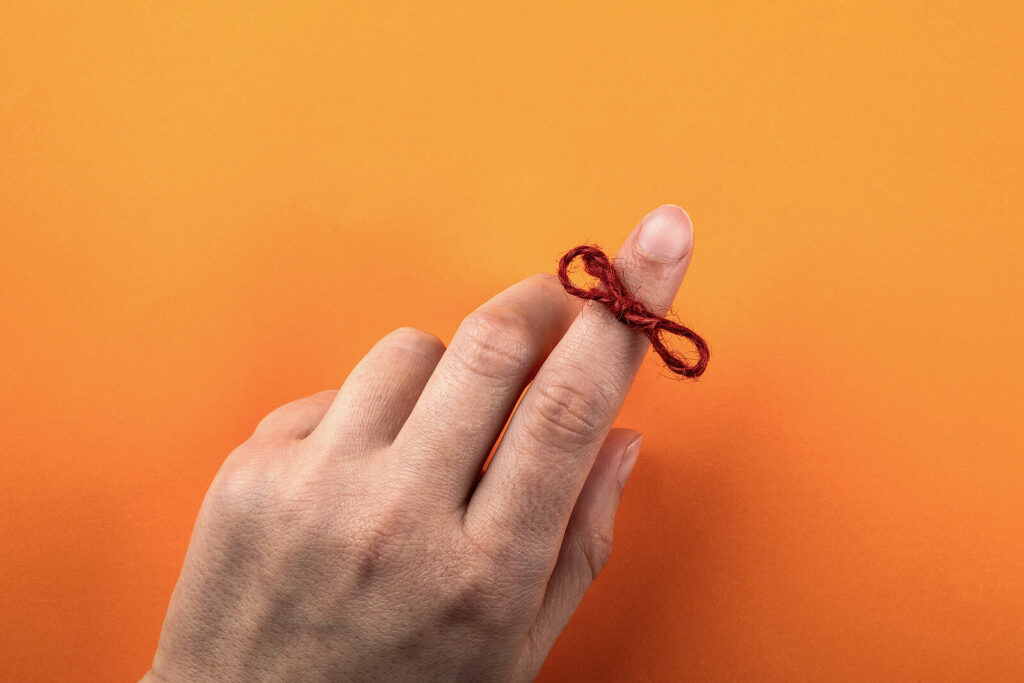If you asked someone how their ADHD affects their daily life, many people would describe their difficulty remembering to complete tasks or their tendency to misplace objects. For example, someone with ADHD might be focused on brushing their teeth until they hear the phone ring in the other room. Shifting their attention to the call, they put down their toothbrush and head over to answer it. An hour later, they walk out of the room to get a snack and are horrified to find water seeping from the bathroom into the hallway. In their rush to answer the phone, they failed to turn off the bathroom faucet and it caused a flood.

While a neurotypical person might blame such a mishap on one’s inherent forgetfulness, this scenario is actually related to a common ADHD symptom: problems with object permanence. Also known as the “out of sight, out of mind” phenomenon, object permanence deficits make it very difficult for people with ADHD to focus their attention on things that are not directly in front of them. In the situation above, the individual was unable to direct their attention back to the task of brushing their teeth once they left the room where that task existed. The unfortunate consequence is that people with ADHD often struggle to follow through on things that are vital to their happiness and success.
What Is Object Permanence?
Object permanence is the ability to understand that things, people, or situations continue to exist when they are not immediately visible to us. Although object impermanence is a frequent feature in ADHD, research related to this concept is found mainly within the context of developmental psychology.
According to Swiss psychologist Jean Piaget, object permanence is a crucial developmental milestone for growing infants. He observed that until babies reach a certain age (usually around 8-12 months old), they are unable to understand that objects continue to exist when they are hidden from view. To test his observation, Piaget conducted a series of experiments where he hid a toy under a blanket. He then watched to see if the infant would search for the object once it was covered. Infants without an understanding of object permanence became frustrated when the toy was covered and directed their attention elsewhere. However, infants that understood object permanence continued looking at the blanket or tried to remove it. This is because they retained the knowledge that the toy underneath still exists.
You can also test for object permanence in babies with a simple game of peek-a-boo. Babies that lack an understanding of object permanence will become confused and upset when their parent hides behind their hands, but are then delighted when their parent reveals themselves again. Without a grasp on object permanence, babies believe that when a person disappears, they are gone forever. When the person suddenly returns to view, however, it is a joyous experience. It’s no wonder that babies can play this game for hours without getting bored.
Do People With ADHD Lack Object Permanence?
Within the context of developmental psychology, object permanence is a rather straightforward concept. Infants are either able to understand that a concealed object continues to exist or they are not. When discussing object permanence in relation to ADHD, however, the definition becomes much more nuanced. It’s not that people with ADHD are unable to comprehend that something exists when it is out of their field of view. To assume this would be to suggest that people with ADHD have a fundamental cognitive impairment in object perception.
Rather, individuals with ADHD have the knowledge that the object is there, but they struggle to maintain an active representation of it in their conscious awareness. In other words, people with ADHD have trouble visualizing an object clearly in their minds when it is not directly in front of them. As such, they need constant visual and auditory cues to help them bring the image of the object into their mental space. Using these cues allows something out of sight to move back into the mind so one can act.
What Are The Consequences Of “Out Of Sight, Out Of Mind”?
When a person with ADHD struggles with object permanence, it impacts both their own lives and the lives of those around them. Colleagues, friends, and family members might at times become frustrated with a person’s inability to carry out tasks or complete the things they said they would. Difficulty remembering things “out of sight” may not be recognized as a symptom of ADHD. Instead, it might be perceived as having an intentional disregard for others. On top of this, object permanence deficits can get in the way of one’s own responsibilities such as paying bills or taking vital medications. Below are some concrete ways object impermanence affects the daily lives of people with ADHD.
Responsibilities
A frequent struggle for those with ADHD is the tendency to misplace objects or forget important tasks. When objects or tasks are not in plain sight, the mental image of them becomes hazy and it’s tough to remember them clearly. Such deficits can be highly impairing and impede one’s daily functioning. For instance, the inability to recall what is “out of sight” can lead someone to frequently misplace their car keys. This person may know they brought them inside after getting home last night, but they are entirely unable to visualize where they put them down. Consequently, they often spend half the morning tearing through the house trying to find them, which makes them regularly late for work.

Another common example of object impermanence in people with ADHD is forgetting to complete scheduled tasks. It’s true that all individuals, neurotypical and neurodivergent, sometimes fall down on important deadlines. The difference for people with ADHD is that they cannot rely on their memory and their internal clock in the same way that neurotypical people can. Individuals with ADHD are fully aware that scheduled tasks exist. They also know that the tasks are usually recurring (e.g. weekly shopping trips or monthly bill payments). However, without a tangible reminder to actually do these tasks, they often do not get completed.
Relationships
Challenges with object permanence can also disrupt one’s ability to maintain relationships. Similar to the way they forget about an object or task when it is not in view, individuals with ADHD struggle to stay connected with people that do not exist in their immediate present. This challenge can manifest in many ways, such as forgetting to respond to texts or emails, missing birthdays, or failing to consistently check in with loved ones. While such forgetfulness is never intentional, the impact of these actions – or more accurately, inactions – can result in friends, family members, and romantic partners feeling neglected and disregarded.
On the flip side, object permanence deficits can affect the way individuals with ADHD perceive their relationships with others. More specifically, object impermanence can cause one to forget that others’ emotions are still present when they are not overtly expressed. This related concept is actually called “emotional permanence”. It is what allows you to feel secure and confident in your relationships without frequent proof that they are going well. However, people that have issues with emotional permanence find it hard to visualize and hold in their minds the emotional support they have received from loved ones in the past. As a result, they seek constant reassurance from their friends and partners. They can also experience separation anxiety when their loved ones are not near.
How Do I Cope With Object Impermanence?
Issues with object permanence can pose a host of obstacles for people with ADHD. If you’re struggling to cope try these strategies and tips.
Use visual cues
One of the most helpful ways to combat problems with object permanence is to find ways to make important things visible in your environment. You can do this by utilizing visual cues around your home or workplace that act as external reminders for the things you often forget. Some examples of effective visual cues include written To-Do lists, wall calendars, Post-it notes, and weekly planners. In addition to these organizational tools, an object itself can be a powerful reminder of things that easily slip the mind.
For instance, if you often forget to take your medication each morning, try storing your pills visibly on your dresser rather than hidden away in the medicine cabinet. If you have difficulty remembering to stay in touch with loved ones, try filling your home with photos of friends and family. This way you are reminded of the important people in your life. Such visual cues will make it easier to envision the objects, situations, and people that you want to remember.
Set recurring alarms
You can augment your use of visual cues by pairing them with auditory reminders such as alarms. An easy way to do this is by creating a recurring reminder on your phone that pops up when a specific scheduled task needs to get completed. For example, you might have an alarm to “Take meds” that occurs daily. Or an alarm to “Pay bills” that occurs monthly. Make sure to set the alerts at a time that is most conducive to you completing the task at that moment. A medication reminder that goes off right as you’re running out the door for work might not be as effective as one that occurs as you’re having your morning coffee.

Collect reminders that you are loved
If you struggle with emotional permanence, it can be challenging to remember that others still care for you when they’re not with you. To combat this, try creating a memorabilia folder full of birthday cards, letters, and other kind words from the important people in your life. You can also start taking screenshots of nice text messages from your friends or partners and file them away on your phone. Having the ability to go back and physically see all the thoughtful things people have said about you will help you remember that you are loved.
Engage in self-compassion and educate people about your ADHD
Despite your best efforts to remember all the important tasks and people in your life, the reality is no one is perfect. There are inevitably going to be times when you fall short of your own expectations or the expectations of others. In these instances, it’s essential to be kind to yourself – try to acknowledge your all of past successes rather than ruminating on this one mistake. Remember that one slip-up does not discount your many other achievements. Additionally, make sure the people around you know about object impermanence and its connection to ADHD. By helping others understand your behavior through the lens of your diagnosis, you can begin an honest dialogue about your needs and the needs of the people around you.
In Conclusion…
Having ADHD affects your capacity to remember things that are not immediately visible in your environment. This challenge represents a problem with object permanence and it explains why people with ADHD tend to relate to the phrase “out of sight, out of mind.” Left unchecked, object impermanence can greatly hinder your ability to complete responsibilities and maintain relationships. As such, it’s important to first acknowledge these difficulties, and then find effective ways to approach and overcome them in daily life.
Begin Online ADHD Therapy in NY
You don’t have to struggle with ADHD symptoms on your own. Our team of expert ADHD-focused therapists would be honored to support you in finding new ways to cope with ADHD from our New York, NY-based practice, please follow these steps:
- Contact the team at ATTN Center
- Learn more about our team and the services offered here!
- Start managing rejection and criticism in a healthier way!
Other Services Offered With The ATTN Center in New York, NY
Our team knows that you may experience more than one mental health concern as a result of ADHD symptoms. This is why we are happy to also offer ADHD-focused therapy for anxiety, depression, and couples. We also provide services including neurofeedback, group therapy, and ADHD testing options. At ATTN Center of NYC, we do everything in our power to treat ADHD without the use of medication, but we understand in some severe cases additional measures may be needed. As a result, we also maintain close relationships with many of NYC’s best psychiatrists. Feel free to visit our articles page for more helpful information today!